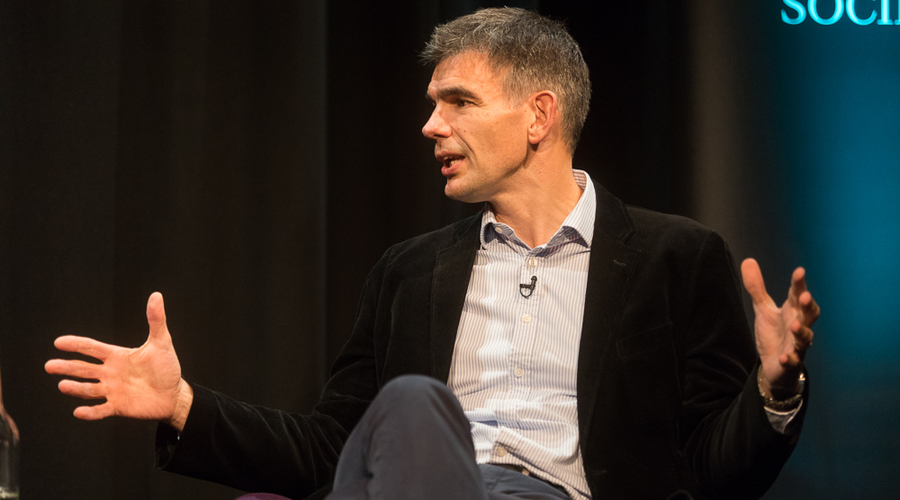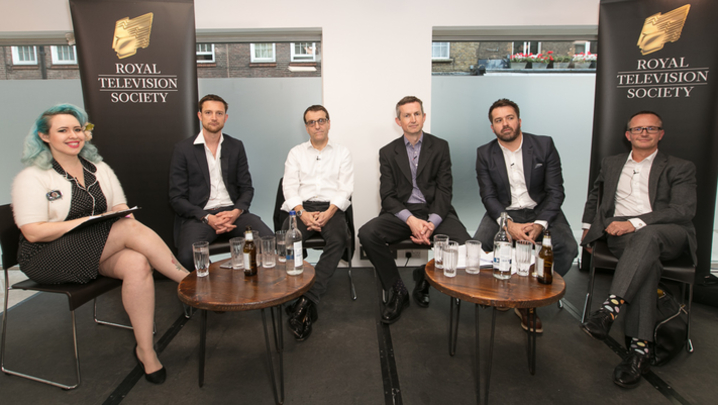The search engine giant’s European head, Matt Brittin, tells the RTS why online and TV need to work together
Broadcasters fear that the global tech giants are hungry for their audiences and advertising. They are probably right to be fearful, but Google’s Matt Brittin had some soothing words for Britain’s TV community, mixed in with criticism, when he spoke at a sold-out RTS event in late November.
“It’s a wonderful industry, but it’s incredibly inward-looking in the UK,” he said. “Don’t take this as me being rude, but – as a Brit who’s proud of, and has grown up with, our amazing content – [I urge you to experiment] with different platforms and technologies. I really believe that there’s an enormous opportunity for original British content.
“We need some positive opportunities for export right now and the [online] audience is there, it’s growing and it’s going to double in the next five years.”
He continued: “People are watching more video than ever before. If you’re making great video content, there’s never been a better time to build an audience – 3.5 billion people online today; 5 billion online by 2020.”
As Google’s head of business and operations in Europe, the Middle East and Africa, he was in conversation with journalist Kate Bulkley at the RTS early-evening event.
She wanted to know whether he accepted that YouTube (snapped up by Google in 2006 for what now seems the ridiculously small sum of £883m) should face greater regulation in the UK. “YouTube is a significant video consumption platform,” she argued. “You’re looking more and more like a broadcaster. Why shouldn’t [you] be regulated like a broadcaster?”
The Google executive agreed that YouTube was now a huge platform: “About 1 billion hours [of video] are watched every day, of which about 100 million hours are on television screens – that’s actually the fastest growing of the screens.”
But he did not accept that YouTube was a broadcaster – which he defined as an organisation that commissions programmes from “professional content creators” to fill airtime. “On YouTube, anybody with a smartphone can upload video content to a YouTube platform and it can be accessed anywhere. That feels slightly different to a broadcaster.”
He was adamant that YouTube was already sufficiently regulated: “We have to comply with all the rules in all the countries in which we operate. We’re not a broadcaster, but we do have responsibilities and regulations that we need to comply with.”
Lord Puttnam, the film producer, is prominent among those who have argued for greater regulation of the tech giants. Indeed, he used an RTS lecture in October to advance the case that legislation – together with robust journalism – was required to protect democracy.
“I’m a big fan of Lord Puttnam – he’s a fantastic industry figure but also a thinker on issues,” said the Google chief. “I don’t think any business person is going to put their hand up and say, ‘We need loads more regulation.’ But we are regulated. We don’t have the same set of rules as a newspaper or a television station – and I think that’s appropriate.”
With the launch of its new subscription service, YouTube Red, in the US two years ago, Google has started to commission original, professional content. Just like, some would argue, a broadcaster.
“Ideally, you want a combination of advertising, subscription and pay-per-view services in the digital world,” explained Google’s European business head. “You want people to have lots of different ways to monetise their content over time.”
With YouTube Red already available in Australia, Mexico, New Zealand and South Korea, it would come to the UK “at some point”, he added. “It’s been relatively popular so far. It gives you a whole bunch of benefits, including exclusive content [and] some music capability.”
But he denied that the company had “any ambition to follow” the model of SVoD companies such as Netflix. “YouTube will remain overwhelmingly this enormous platform where people can share and find content of all sorts.”
Later on at the RTS event, he tackled the eruption of fake news online, and Google’s response to it. The company wanted “good content to thrive and have a sustainable business model,” he said, “and we want to stop bad actors and bad content.”
Google News, which launched 15 years ago and now aggregates news from 80,000 accredited sources, provides some of that “good content”, he argued.
Google’s approach to the “bad content” was to “follow the money” and remove the economic incentive to produce fake news.
“Why was a Macedonian village publishing 100 websites about the US elections, purporting to be from US newspapers?” he asked. “Because they could make money. We don’t want them to make money from our programmes, so we have tried to introduce much better screening for misrepresentation – you have to be who you say you are.”
At the end of the evening, he sought to reassure broadcasters worried by the rise of the online platforms: “At Google, we love the TV industry and we want to be partners in the transformation. Some bits of it are bumpy, but, genuinely, it’s a huge opportunity.
“I hope we can be partners in making amazing content that comes from here and thrives across the world.”
The RTS early-evening event ‘In conversation with Matt Brittin’ was held at The Hospital Club in central London on 29 November. The producer was Paul Naha-Biswas.
Making the web safe for brands
Over the past year, brands have withdrawn business from YouTube in response to their ads inadvertently being placed next to extremist material and inappropriate videos of children.
At the RTS event, Google’s Matt Brittin explained how YouTube had been addressing this problem. ‘We’ve put in place a combination of policies [and] enforcement processes, and [worked] closely with real experts in some of these types of content – we’ve made real progress,’ he said. ‘One of our challenges has been: how do you identify these things at speed and address them before they get any audience at all – this is where we use a combination of people and machines.
‘People look at and classify videos against these policies, including working with expert non-governmental organisations and language experts, and then [use] what they’ve done to train machines.’
The Google executive claimed that ‘more than 83% of the content we remove for violent extremism is removed before it meets any human “flagger”’.
Since June, when YouTube introduced a new child protection policy, he said, 2 million videos no longer supported advertising and 165,000 videos had been removed altogether.
Exploit your data to boost revenue
Google’s Matt Brittin mounted a stout defence against charges that his company is hoovering up both advertising data and television’s advertising revenues.
‘Data is the new oil – everybody wants data,’ suggested event chair Kate Bulkley. The Google executive strongly refuted this assertion: ‘Oil is a scarce resource, the control of which has, historically, led to tremendous wealth.
‘Data is an infinite resource – we’re creating data at an astonishing rate. With oil, either you’ve got it or we’ve got it – we can’t both have it.
‘With data, you and I and everyone in this room can all have the same data and all use it at the same time, and we can combine it with our own data.
‘It’s not [about] having data – it’s what you do with it.’
The chair tried a new line of attack. ‘TV companies think that you are after their advertising money,’ she said. ‘Your business model is advertising.’
‘Absolutely right, and we will compete violently for advertising just like the rest of the industry does,’ he responded.
But the Google chief claimed that YouTube was generous with the advertising revenue it pulled in, returning much of it to the people making its videos and programmes.
‘On YouTube, when we put advertising around content, the majority of the revenue goes to the content creator,’ he said, adding that ‘the split is around the 50:50 mark’.
Moreover, he argued, YouTube attracted a different type of advertiser to those buying spots on linear-TV: ‘People often say that Facebook and Google are taking all the money out of the market… but search advertising is a whole new category of advertising.
‘When you look at a TV company or a newspaper, they typically have 100 to 200 advertisers that represent 80+% of the total revenue.
‘Google has millions of advertisers – the vast majority are small companies that have never advertised on television or in the newspapers.’
Question & answer
Q: What can online platforms offer sport?
A: Matt Brittin: There are huge opportunities for sports – some do it well, some are just starting, some haven’t figured it out, yet.
Will we bid for big sports rights? We have done – for cricket in India in the past as an experiment – [but] I don’t think, right now, that the advertising model is enough to fund that kind of bid; a subscription model might be.
I don’t think that we’re going to be at the front of the queue on subscription models for a while, but who knows? It depends on the consumer.… But I do think that there’s an opportunity for every sport and every hobby to be online and share its passion.
Q: Do you have three pieces of advice for a commercial broadcaster?
A: Matt Brittin: Show up, wise up and speed up.…
Show up: be where the digital stuff is happening… you’ve got to be where people are.…
Wise up: data is abundant and can be used by everyone, but it’s totally useless unless it leads to an insight that can allow you to take action.… [In] the digital world, every interaction can make you smarter.…
Speed up – literally. If a mobile page takes more than three seconds to load, 50% of people leave. Speed is now the killer app online and on mobile [and there is] also speed of organisational change.… 5 billion people [will be online] by 2020 on 25 billion connected devices.






